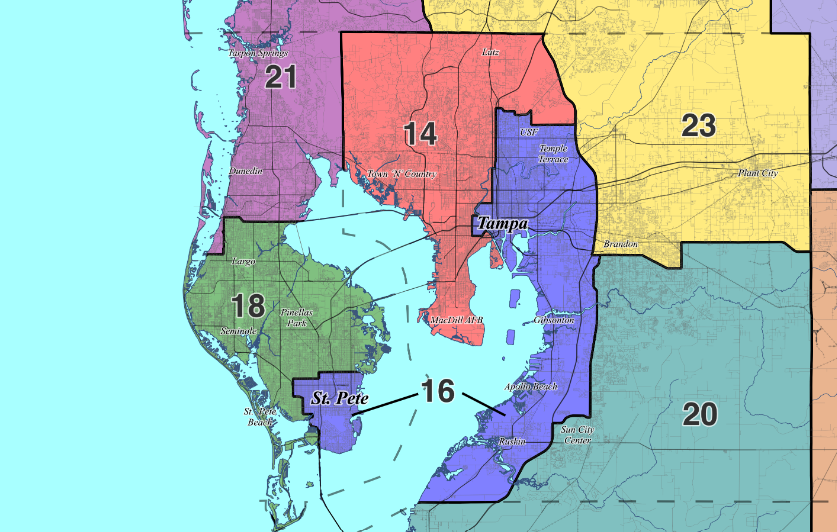August 19, 2025 Story by: Publisher
A federal judicial panel upheld Florida’s 2022 state Senate redistricting plan, dismissing arguments that the plan unfairly undermines the influence of Black voters in the Tampa Bay area.
The case centered on Senate District 16—a district that reaches across Tampa Bay, linking parts of Pinellas and Hillsborough counties. Plaintiffs, comprising three Black residents from these counties, argued that the district was racially gerrymandered, diminishing the political voice of Black voters in neighboring District 18, a claim tied to the district’s previous representation by Democrat Darryl Rouson.
After a four-day bench trial in June, the three-judge panel issued a 78-page ruling stating that race did not predominate in drawing the district lines. The judges—U.S. Circuit Court Judge Andrew Brasher and U.S. Senior District Judges Thomas Barber and Charlene Edwards Honeywell—concluded that the Legislature respected traditional, race-neutral criteria and did not use racial targets or quotas.
“The plaintiffs have not met their burden, whether through direct or circumstantial evidence, to prove that racial considerations subordinated race-neutral criteria. Though the legislature certainly considered racial demographics to confirm that District 16 complied with tier-one requirements, it did not subordinate race-neutral considerations to race-based objectives. The Senate never set racial targets or quotas.”
The suit, filed by the ACLU of Florida and the Civil Rights & Racial Justice Clinic at New York University on behalf of three residents of Tampa and St. Petersburg, alleges the Legislature packed Black voters into District 16 to reduce their influence in nearby District 18.
Plaintiffs argue the district was drawn in 2022 to dilute Black voting strength in Pinellas and Hillsborough counties, in breach of the Equal Protection Clause and Florida’s Fair Districts constitutional amendments.
The court emphasized that the ruling aligns with Florida’s constitutional redistricting standards, including the “non-diminishment” clause designed to safeguard minority voting strength. Despite this, the panel found no evidence that legislators subordinated these principles to racial considerations.
The outcome marks another legal success for Florida Republicans in redistricting disputes. Last month, the Florida Supreme Court upheld a congressional map that eliminated a majority-Black seat in North Florida.
The Florida Legislature approved a redistricting plan in February 2022, and the new district boundaries were implemented for the 2022 elections. Sen. Rouson secured 63.9% of the vote in District 16, while Sen. DiCeglie won District 18 with 56.9%. Neither district was on the 2024 ballot.
The district configurations are partly influenced by the 2010 Fair Districts constitutional amendments, which requires that new maps do not “diminish” the ability of racial minorities to elect candidates of their choice.
Background
In April 2024, a legal challenge filed by individuals from Tampa and St. Petersburg claims that Senate District 16 and Senate District 18 have been gerrymandered to the detriment of Black voters and violate their constitutional rights to equal protection. Senate District 16, represented by Democrat Darryl Rouson, encompasses parts of both Pinellas and Hillsborough counties, extending across Tampa Bay. Senate District 18, represented by Republican Nick DiCeglie, covers portions of Pinellas County, including areas such as Indian Rocks Beach.
A lawsuit, spanning 31 pages, argued that the state’s delineation of these districts failed to uphold traditional redistricting principles and instead resorted to racial gerrymandering, thereby diminishing Black voters’ influence. Despite purported efforts to safeguard Black voters’ representation in District 16, the lawsuit contends that the state’s approach unjustly concentrates Black voters into certain areas while diluting their impact elsewhere.
The Florida Senate and Secretary of State Cord Byrd urged a federal judicial panel last week to dismiss the lawsuit challenging the constitutionality of a 2022 Senate redistricting plan. The case argued that two districts in the Tampa Bay area were racially gerrymandered.
Attorneys representing Senate President Ben Albritton, R-Wauchula, and Secretary Byrd submitted motions for summary judgment, aiming to resolve the case without a trial.

Photo caption: Florida Senate districts for the Tampa Bay region as drawn by the Florida Legislature. (Photo courtesy of: ACLU lawsuit)
According to the plaintiffs, the legislative redistricting plan grouped Black populations from two counties into District 16, which they argue “sacrificed genuine communities of interest” and “unjustifiably packed Black voters into District 16, stripping them from adjacent District 18 and reducing their influence there.” They claim this configuration violated equal-protection rights.
In response, motions filed by the defense disputed these claims. Byrd’s legal team argued that similar bay-crossing districts have existed since at least 1992. They also suggested that the plaintiffs’ proposals aim to create a new Democratic district.
In June 2025, the federal trial concluded before a three judge panel as litigants squared off on whether Florida’s Legislature racially gerrymandered State Senate District 16. This district includes a portion of south St. Petersburg, along with Tampa, Temple Terrace, and down to Ruskin.
North Hillsborough resident and lead plaintiff Keto Nord Hodges testified in court about the district’s lines.
Plaintiffs submitted an alternate map as evidence. They wanted District 16 to just include portions of Tampa and Hillsborough. Then District 18 will pick up the southern tip of Pinellas County, which could also make it less of a Republican-leaning district than the current district.
Source: WUSF / AP News / Politico / Florida Politics

















